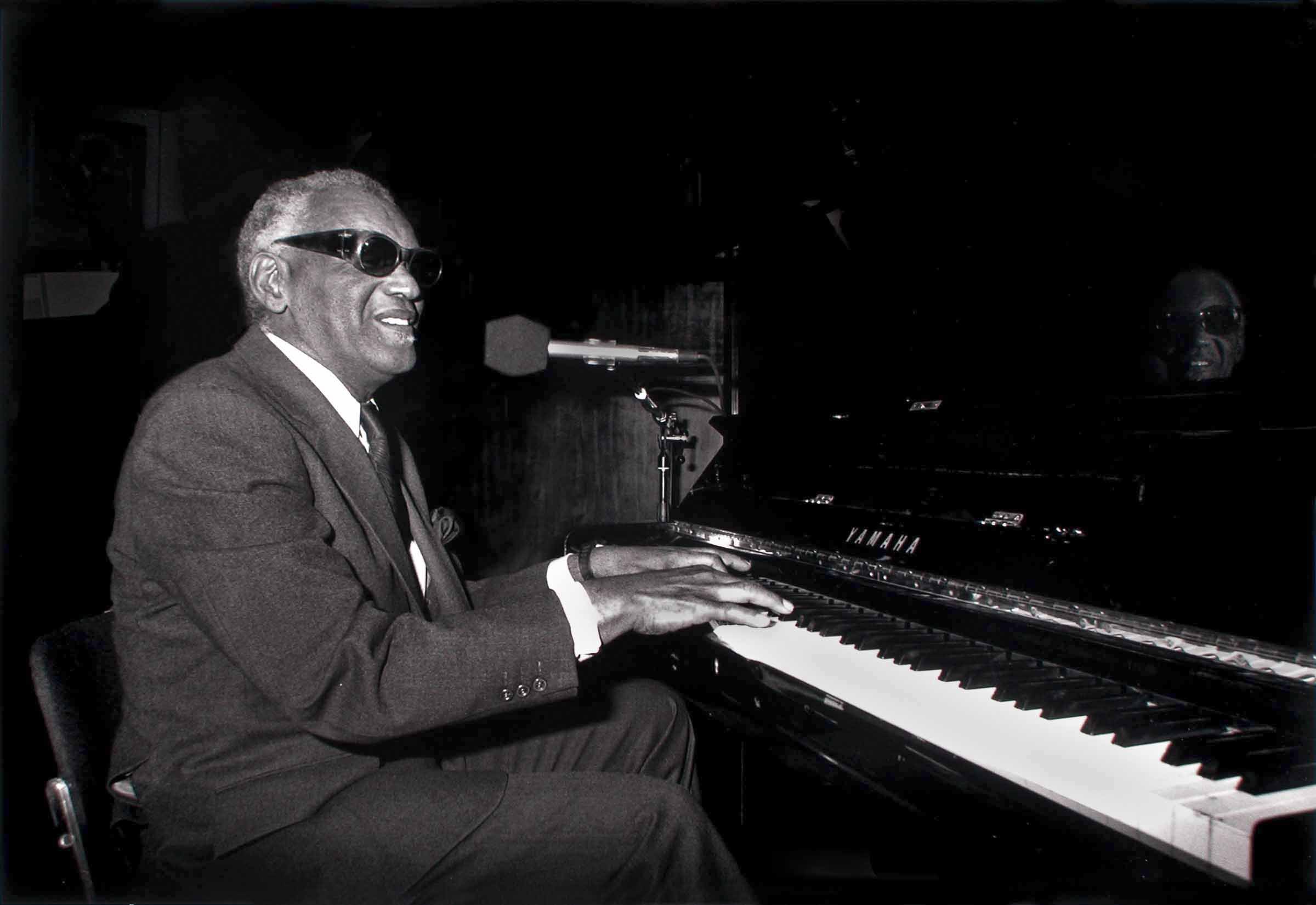When you talk about legendary music producers, Ray Charles is a name that lights up the room. He wasn’t just any guy messing around with a mixing board; he was a genius who shaped the sound of American music. His influence on soul, R&B, and jazz is undeniable, and his work as a producer left an indelible mark on the industry. So, buckle up, because we’re diving deep into the world of Ray Charles and uncovering the magic behind his production prowess.
Picture this: a guy with no sight but with a vision so sharp it could cut through the noise of the music world. That’s Ray Charles for you. His journey wasn’t just about making hits; it was about creating a legacy that would inspire generations to come. From his early days in the studio to his legendary collaborations, Ray Charles wasn’t just producing music—he was crafting history.
But what exactly made Ray Charles such an incredible producer? Was it his unique approach, his unparalleled talent, or his ability to blend genres like no one else could? Stick around, because we’re about to break it all down for you. Whether you’re a fan of his music or just curious about the man behind the scenes, this article has got you covered.
Read also:Jennifer Syme The Life Legacy And Untold Stories
Biography of Ray Charles
Early Life and Background
Before he became a music icon, Ray Charles was just a kid growing up in the small town of Greenville, Florida. Born on September 23, 1930, Ray Charles Robinson faced challenges from the get-go. At the age of seven, he lost his sight completely due to glaucoma. But instead of letting his blindness define him, Ray let his passion for music guide him. His mother, Aretha Robinson, played a crucial role in shaping his early years, encouraging him to pursue his dreams despite the odds.
By the time he was a teenager, Ray was already performing in local bands and developing his unique style. His early influences ranged from gospel to jazz, blues to country, and this eclectic mix would later define his sound as a producer. But let’s not forget—the journey wasn’t always smooth. Ray faced racism, poverty, and personal struggles, but through it all, his music remained a beacon of hope and resilience.
Key Facts About Ray Charles
Here’s a quick look at some key facts about Ray Charles:
- Birth Name: Ray Charles Robinson
- Date of Birth: September 23, 1930
- Place of Birth: Albany, Georgia
- Genre: R&B, Soul, Jazz, Blues
- Claim to Fame: Pioneering the genre of soul music
- Major Awards: 17 Grammy Awards, Presidential Medal of Freedom
Ray Charles as a Producer
Breaking Down His Production Style
When it came to producing music, Ray Charles had a style all his own. He wasn’t afraid to experiment, and he had a knack for blending genres in ways that no one else could. His approach was simple yet effective—he let the music speak for itself. Ray believed in the power of authenticity, and that’s what made his productions so timeless.
One of the things that set Ray apart was his ability to create music that resonated with people on a deeply emotional level. Whether it was a soulful ballad or an upbeat jazz number, Ray knew how to connect with his audience. His productions weren’t just about sound; they were about storytelling, and that’s what made them so special.
Techniques Used by Ray Charles
Ray Charles didn’t just rely on his natural talent to produce music. He had a set of techniques that he used to create his signature sound. Here are a few:
Read also:Unveiling The Fascinating Story Of Anita Maria Smith And Her Italian Legacy
- Layering: Ray loved to layer different instruments to create a rich, full sound.
- Improvisation: He encouraged his musicians to improvise, giving his tracks a raw, organic feel.
- Blending Genres: Ray wasn’t afraid to mix genres, creating a sound that was uniquely his own.
- Vocal Arrangements: His vocal arrangements were always spot-on, adding depth and emotion to his tracks.
Top Hits Produced by Ray Charles
“What’d I Say”
Let’s talk about one of Ray’s biggest hits, “What’d I Say.” This track wasn’t just a song—it was a revolution. Released in 1959, it became a crossover hit, reaching audiences across genres and demographics. The song’s infectious rhythm and raw energy made it a staple of the soul music genre, and it remains a fan favorite to this day.
“Georgia on My Mind”
Another iconic track produced by Ray Charles is “Georgia on My Mind.” Originally written by Hoagy Carmichael and Stuart Gorrell, Ray’s version turned it into a soulful masterpiece. His heartfelt delivery and the lush orchestration made it a chart-topping hit and earned him a Grammy Award for Best Vocal Performance.
Influence on the Music Industry
Ray Charles: The Pioneer
Ray Charles didn’t just produce music; he paved the way for future artists and producers. His innovative approach to blending genres and his emphasis on authenticity set a new standard for the music industry. Artists like Aretha Franklin, Stevie Wonder, and countless others have cited Ray as a major influence on their work.
But Ray’s influence goes beyond just music. He was a trailblazer in terms of civil rights and social justice. His willingness to speak out against racism and inequality inspired a generation of artists to use their platforms for change. In many ways, Ray Charles wasn’t just a producer—he was a revolutionary.
Collaborations and Partnerships
Working with the Best
Throughout his career, Ray Charles worked with some of the biggest names in the music industry. From Quincy Jones to Willie Nelson, Ray’s collaborations were always a hit. He had a knack for bringing out the best in his collaborators, creating music that was greater than the sum of its parts.
One of his most famous collaborations was with Betty Carter on the album “Ray & Betty.” The album showcased the chemistry between the two artists and highlighted Ray’s ability to work seamlessly with others. It’s collaborations like these that demonstrate Ray’s versatility as a producer and his ability to adapt to different styles and sounds.
The Legacy of Ray Charles
Impact on Future Generations
Even after his passing in 2004, Ray Charles continues to inspire new generations of musicians and producers. His influence can be heard in the work of contemporary artists like Bruno Mars, Alicia Keys, and John Legend, who all cite Ray as a major influence on their music.
But Ray’s legacy extends beyond just music. He’s become a symbol of resilience, creativity, and innovation. His story serves as a reminder that no matter what challenges you face, you can overcome them with passion and determination. And that’s a lesson that resonates with people from all walks of life.
Challenges Faced by Ray Charles
Overcoming Adversity
Ray Charles faced numerous challenges throughout his career, from his battle with drug addiction to the racism he encountered as a Black artist in the 1950s and 60s. But instead of letting these obstacles defeat him, Ray used them as fuel to drive his creativity. He once said, “I don’t care much about music. What I like is sound. If it’s good, that’s what counts.”
His ability to rise above adversity and continue creating music that touched people’s hearts is a testament to his strength and resilience. Ray Charles wasn’t just a producer; he was a fighter, and his story is one of triumph over hardship.
Ray Charles and the Business of Music
Breaking Barriers in the Industry
Ray Charles wasn’t just a talented musician; he was also a savvy businessman. He understood the importance of owning his music and controlling his career, and he fought tirelessly to ensure that he had the rights to his work. In the 1960s, Ray became one of the first Black artists to gain full creative control over his recordings, setting a precedent for future artists.
His business acumen and willingness to challenge the status quo made him a trailblazer in the music industry. Ray Charles wasn’t just producing music; he was changing the game, and his impact on the business side of the industry is just as significant as his musical achievements.
Conclusion
So there you have it—the incredible story of Ray Charles, the man who redefined music production and left an indelible mark on the industry. From his early days in Greenville to his rise as a music icon, Ray’s journey is one of inspiration and resilience. His contributions to the world of music are immeasurable, and his legacy continues to inspire new generations of artists and producers.
As you listen to his music, take a moment to appreciate the man behind the scenes—the producer who shaped the sound of American music. And if you’re feeling inspired, why not leave a comment or share this article with your friends? After all, Ray Charles would want nothing more than for his story to be heard by as many people as possible.
Table of Contents
- Biography of Ray Charles
- Early Life and Background
- Key Facts About Ray Charles
- Ray Charles as a Producer
- Breaking Down His Production Style
- Techniques Used by Ray Charles
- Top Hits Produced by Ray Charles
- Influence on the Music Industry
- Collaborations and Partnerships
- The Legacy of Ray Charles
- Challenges Faced by Ray Charles
- Ray Charles and the Business of Music


